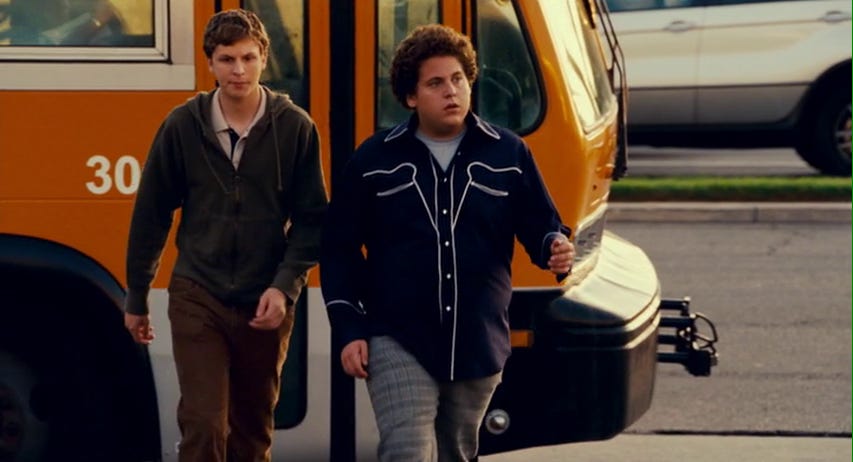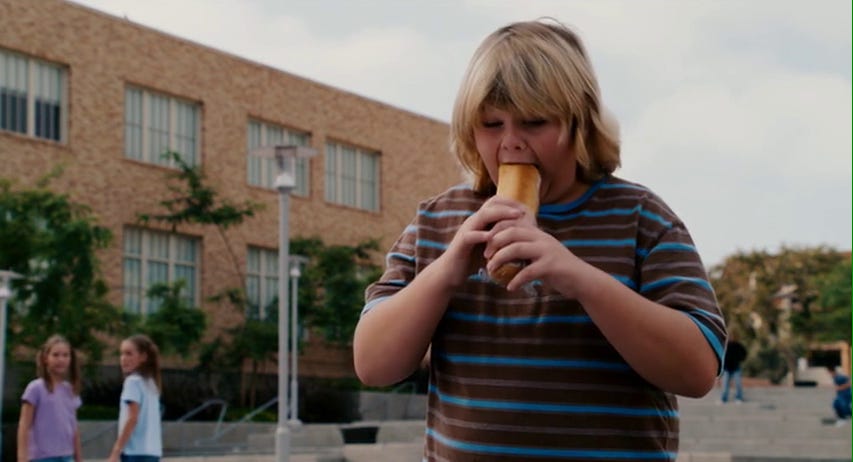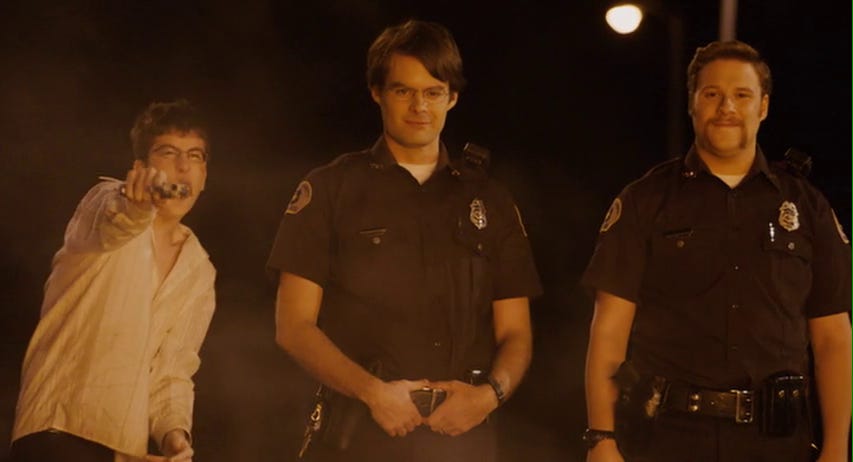Anglophone fiction has an anti-hero problem. It’s remarkably easy to find people who think that characters like Rorschach from the graphic novel and motion picture Watchmen or Tyler Durden from the novel and film Fight Club or any number of manifestations of the evil clown criminal who fights Batman are figures worthy of admiration and emulation. They think this because they are compelling and interesting and complex figures, and people too easily conflate “compelling and interesting and complex” with “virtuous”. I have no ready-made solution for this. My immediate response when someone says that Mark Zuckerberg as depicted in The Social Network (2010) made them want to be a tech entrepreneur or that Amy from Gone Girl (2014)1 is a girlboss is to shake them violently about the shoulders until they see sense. Sometimes people get it right, and we have a depiction of protagonists behaving badly where it is completely obvious to the viewer that they are not to be admired. If only people could portray The Joker the way that Greg Mottola portrays the protagonists of Superbad we might have a functional society.
Superbad is the story of a pair of teens named Evan (Michael Cera) and Seth (Jonah Hill) who are nearing their high school graduation. They have a deep platonic love for each other to the point of codependency, they are also about to attend different colleges and be away from each other for the first time since they were 8 years old, and they desperately want to have sex with their respective crushes Becca (Martha MacIsaac) and Jules (Emma Stone). When they find out that Jules is throwing a party, they offer to supply alcohol, as their friend Fogell (Christopher Mintz-Plasse) has freshly acquired a fake ID. Unfortunately these three boys are turbo-doofuses, and manage to get in their own way in spectacular fashions as they attempt to get themselves and their hooch to Jules’s party to get laid.
Ever since I was old enough to watch them, teen comedies have been one of my favorite kinds of films to watch. There’s something magnificent about seeing someone with extreme confidence try to perform tasks that they’re bad at, and the entire experience of being a teenager is faking confidence at being an adult and often being very bad at it. Unfortunately, teen comedies have a nasty tendency to age like milk. I loved Sixteen Candles (1984) when I first saw it, but the film’s iffy notions of how sexual consent works and extreme anti-asian racism make it a mixed bag at best rewatching it now. When I saw that Superbad was coming on my watch list, I simultaneously looked forward to revisiting it as I had pleasant memories of how funny it was, and dreaded the incoming cringe of how some of the jokes would land. Folks, Superbad has aged well. What I can’t tell you is that Superbad is free from sexist and homophobic jokes. What I can tell you is that these jokes are used just as much to shine a light on the ignorance of their tellers as they are jokes at the expense of the girlies and gays that they seek to mock. Superbad never says “gays: aren’t they weird?” so much as it says “straight men: look at how dumb they are for needing to prove their own masculinity by talking about how not-gay they are”.
Storytelling requires conflict, and so naturally the plot of the film isn’t simply “Seth and Evan buy some liquor and they go to the party and everyone has a good time”. The thing is, that could have been the plot had the protagonists had a gram of self-awareness or emotional intelligence. The obstacles that prevent them from getting to the party with the booze are equal parts bad luck and their own unforced errors. A great deal of the conflict stems from the fact that the protagonists are attempting to navigate their way across Los Angeles without a car, and the reason they don’t have a car is that Seth parks his 1992 Geo Metro in the faculty lot of his high school in the first scene, claiming that his status as a senior means that people won’t care (they do. It gets towed). Then, the boys go through increasingly absurd sets of situations in order to arrive at the party with booze due to their assumption that no one will enjoy their company without it. They also assume that the objects of their affection will have no interest in them when sober. Both of these assumptions are profoundly false, causing them to suffer for no good reason.
This characters’ combination of absurd self-confidence and simultaneous lack of the same somehow results in Evan singing the song “These Eyes” by The Guess Who at knifepoint2 as Seth decants a case of beer into an empty bulk laundry detergent container directly after having washed menstrual blood off his pants. Had you been capable of reading a room for once in your lives you would not be in this situation, gentlemen.
The biggest problem I expected to face revisiting Superbad — a film primarily about teen boys who want to get girls drunk so that they can sleep with them — is that its notion of sexual consent would turn out reprehensible. Superbad was notoriously written by comedy geniuses Seth Rogen and Evan Goldberg while they were still teenagers. I knew many men well into adulthood in the mid 2000s whose understanding of enthusiastic consent was… dubious at best. As I watched, I braced myself for how atrociously these scenes would play out as written by a pair of teens from the 1990s. I could not be more wrong. I don’t know if it’s because Goldberg and Rogen are just the most special boys, or if the Vancouver, BC public school system has a more robust sex ed program than I’m used to here in the USA, but the film firmly puts its foot down that getting girls drunk to sleep with them is a bad idea. It does this, as with other situations, by having the boys get in their own way.
Upon arrival to the party, Evan discovers that Becca is already hammered, and clearly in no state to kiss him. He decides to rectify this by finding a loophole: it’s okay to sleep with a drunk girl if you’re just as drunk as she is. He then spends the next few minutes pounding hooch as fast as possible to match Becca’s state. Naturally this ends poorly. Seth meantime takes the much more familiar (and just as disappointing) take that the only way he’ll be likable is if he’s a little drunk, and so begins drinking like a monster before approaching Jules, only to discover that she’s a teetotaller and refuses to engage with amorous activity with him because he’s drunk. If even one of these characters had simply been normal about interacting with people they want to have sex with (who also want to have sex with them) their evenings could have ended with mutually satisfying orgasms instead of vomit and black eyes.
Overriding all of this is Evan and Seth’s refusal to talk about the future of their friendship, which is clearly very precious to them. I had a deep friendship to the point of mild codependency in high school (you may have heard of my friend. I’m given to understand he’s relatively well known on TikTok for his antics as the mayor of the village of Gambier, Ohio, and had a fairly well respected web series where he impersonated HP Lovecraft. To me though he’s still simply the man I know I can crack up by stating the phrase “ask him about foreign films”) and that friendship remains very precious to me. In another world where we were worse about keeping in touch I can imagine us drifting apart, and even thinking about that hypothetical makes me profoundly sad. For the majority of the film this possibility is clearly gnawing at Evan and Seth but neither of them wants to acknowledge it given that they’re both going to different colleges in different parts of the country. Rather than acknowledge it of course, they do dumb little boys-will-be-boys sniping at each other until finally their feelings come spilling out of them while intoxicated. Things end up alright, but once again, the slightest crumb of emotional intelligence could have rendered this entire point of conflict moot.
It’s a lot to put on a teen sex comedy to say “this is the model of how you portray flawed protagonists without expecting the audience to excuse those flaws”, but honestly the fact that a movie like Superbad pulls off walking this tightrope in addition to being a vessel for jokes only serves to make those jokes funnier. Having a character’s name on his fake ID be the mononym “McLovin” is funny. Making me care deeply about the development and emotional journey of McLovin is hilarious.
Rating: ★★★★☆ In my attempt to write about the moral center of the motion picture Superbad I somehow omitted how funny it still is. Folks, the McLovin bits still hit. The idiot cops still hit. The compulsive drawings of dicks still hit. Hell, the interpolation of the soundtrack (mostly 70s funk masterpieces or original soundtrack compositions performed by 70s funk masters) played against shots of geeky white boys doing geeky white boy things still hits. If you enjoy the genre of teenagers behaving badly, Superbad deserves its place in the pantheon alongside Fast Times At Ridgemont High (1982), Better Off Dead (1985), and Can’t Hardly Wait (1998).
Economics: Superbad opened at #1 at the box office on August 17, 2007, ahead of Rush Hour 3 in its second week of release. It would go on to make $169 million at the worldwide box office plus a staggering $137 million in DVD sales against a $20 million budget, providing a remarkable ROI on Sony Pictures’ investment. Despite its success, it remains the last great success story in the teen sex comedy genre, despite the additions of critically beloved fare like Easy A (2010), Booksmart (2019), and Bottoms (2024) since. To the best of my knowledge, teens remain horny and stupid and like going to the movies, so it truly feels like money sitting on the table. Your move, Hollywood.
given how often it happens with his films I have a pet theory that director David Fincher might secretly be a menace to society given how often his anti-heroes are praised by rubes.
special shoutout to veteran character actor / ‘that guy from that thing’ David Krumholz in this scene who plays a dirtbag with a knife and a ponytail that’s just a little too short. Dude gives a very specific performance in a very short amount of scene time as “guy who’s a lot of fun to be around until all of the sudden he’s not at all”









